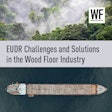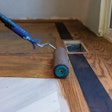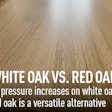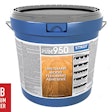In the next few months, formaldehyde is going to be back in the news. CARB has been reviewing their regulations and is expected to announce significant changes within the next month that may particularly impact on the flooring industry. On the national front, the EPA is still working on the details of their regulations-it is hoped that sometime this summer they will open their proposal up for public comments.
CARB uses (and the EPA will likely continue this policy) a system of "process certification," rather than "product certification." This is a very important distinction for flooring dealers to recognize.
A product certification means that the Third Party Certifier (TPC) is stating that each piece of product has actually been produced compliant with the required specification.
A process certification means that the TPC has verified that the factory is capable of producing product to the required specification.
In process certification, the certifying body has no liability if the product is outside the standard. They've only checked for capability-in the case of CARB, they will audit the facility (checking equipment, glue, procedures, etc.) and they will spot-check production at least quarterly for formaldehyde levels. But they do not have inspectors stationed in the facility or check production as it comes out on a regular basis. Any buyers purchasing process-certified material are doing so fully at their own risk. They are unable to go back to the certifier if the product fails to meet the standards. CARB regulations clearly state that "The manufacturer is responsible for the performance of all certified products."
In product certification, however, the certifying body assumes at least partial financial liability, and they respond accordingly. They will have inspectors in the factory weekly, even daily, and they will spot check material constantly. Obviously this would be a significant expense for the TPC and, accordingly, costs for a certified product are significantly higher. Product certification is usually reserved for material that has the need for the higher standards. (Composite wood products that are certified can include structural plywood and OSB. Most folks would agree that the liability issues for a roof system might be a little higher than for a sofa.)
Now, a process based certification can be just fine. And the flooring industry cannot afford to see every plank independently certified as a product. It is going to be costly enough when we are forced to establish a national process certification for our material.
It is important, however, that as buyers and sellers, we recognize the limitations and liability of a process based certification and establish systems of due diligence that will help ensure that our products meet our specifications. Remember, the certifying bodies aren't providing us with any guarantees…
































